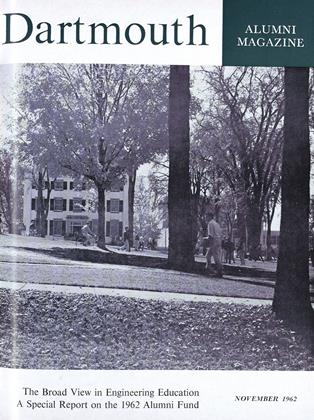WITH forty prominent leaders of Japanese and American life and thought participating, a week-long round table conference took place at Dartmouth College, October 1-7, to discuss the main problems involved in the relations between Japan and the United States.
The conference, sponsored jointly by the College and International House of Japan, and supported by The Ford Foundation, was similar to the informal meeting of Russian and American delegates held in Hanover in the fall of 1960. Cochairmen of the conference were President Dickey and Shigeharu Matsumoto of Tokyo, managing director of International House of Japan.
The two groups assembled for the discussions, described as "vigorous and frank," consisted of men prominent in public, academic, cultural, and business life. At their sessions in Sanborn House and at their more informal gatherings during the week a variety of issues were explored freely and fully, including the problem of Communist China, disarmament, economic and trade relations, and the status of democracy in Japan and the United States. An attempt was made also to assess the significance of likely developments during the next ten years.
At the end of the conference, Mr. Matsumoto expressed the hope that a second conference could be held in Japan.
The other members of the Japanese delegation which he headed were Tadashi Fukutake, professor of sociology, University of Tokyo; Takeshi Ishida, lecturer in political science, University of Tokyo; Shigeru Ishikawa, professor of Chinese studies, Hitotsubashi University, Tokyo; Shigeki Kato, professor of Asian studies, University of British Columbia, Vancouver; Michio Nagai, professor of sociology, Tokyo Institute of Technology; Yonosuke Nagai, professor of political science, University of Tokyo; Yoshio Nakano, literary critic; Soichiro Ohara, president, Kurashiki Rayon Company, Osaka; Masamichi Royama, director, Social Science Research Institute, International Christian University, Tokyo; Makoto Saito, professor of American political history, Faculty of Law, University of Tokyo; Yoshikazu Sakamoto, professor of international politics, University of Tokyo; Shinjiro Tanaka, international affairs writer; Seiichi Tobata, director, Institute of Asian Economic Affairs; Toshiyuki Toyoda, professor of physics, St. Paul's University, Tokyo; and Shigeto Tsuru, professor of economics, Institute of Economic Research, Hitotsubashi University, Tokyo.
The participants from this country were Hanson Baldwin, military editor, The New York Times; A. Doak Barnett, associate professor of government, East Asian Institute, Columbia University; Saul Bellow, novelist; Kenneth E. Boulding, professor of economics, University of Michigan; Donald K. David, former chairman, Committee for Economic Development and vice-chairman of the board, The Ford Foundation; John Sloan Dickey, president, Dartmouth College; Paul H. Doty Jr., professor of chemistry, Harvard University; David R. Inglis, senior physicist, Argonne National Laboratory; Henry R. Lieberman, assistant news editor, The New York Times; Philip E. Mosely, director of studies, Council on Foreign Relations; Herbert Passin, professor of sociology, East Asian Institute, Columbia University; David Riesman, Henry Ford II Professor of Social Science, Harvard University.
Also, Eugene V. Rostow, Dean of the School of Law, Yale University; Walt W. Rostow, deputy special assistant for national security, The White House; Richard Rovere, political columnist for NewYorker magazine; Arthur Schlesinger Jr., special assistant to the President; Frederick Seitz, president, National Academy of Sciences; Edward Shils, professor, Committee on Social Thought, University of Chicago, and Fellow of King's College, Cambridge; Shepard A. Stone '29, director of international affairs, The Ford Foundation; James Tobin, Sterling Professor of Economics, Yale University; and Lionel Trilling, professor of English, Columbia University.
American observers were Marius Jansen, professor of history, Princeton University; Donald H. McLean Jr. of the Rockefeller Brothers Fund; and James Morley, associate professor of government, East Asian Institute, Columbia University.
Shigeharu Matsumoto of Tokyo, directorof International House of Japan, was aco-chairman of the Hanover conference.
Delegates at a session in the Wren Room of Sanborn English House.
 View Full Issue
View Full Issue













